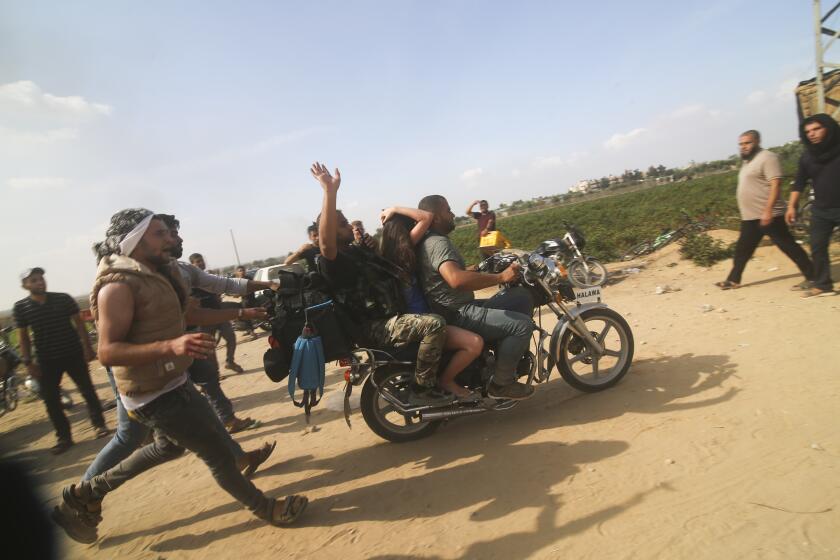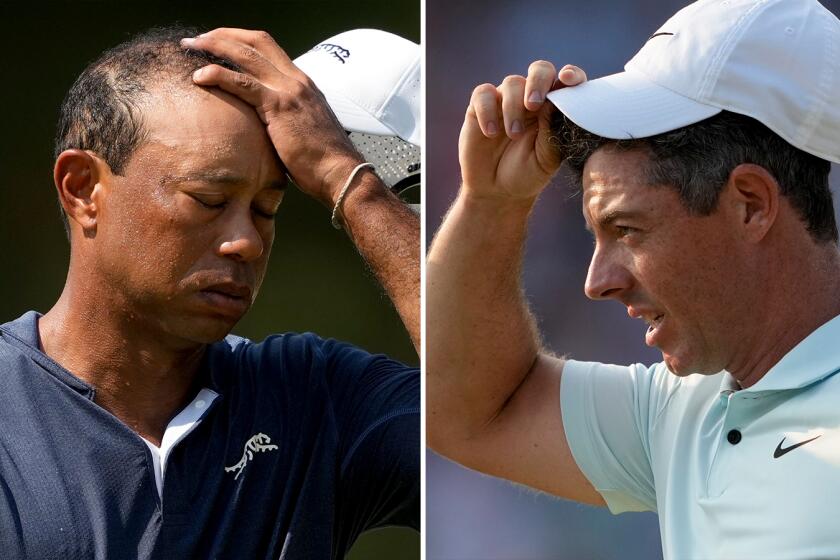Russians Ratify Arms Control Pact
After more than seven years of discord and delay, Russia’s lower house of parliament signaled a new era in U.S.-Russian relations Friday by ratifying the landmark START II arms control treaty.
The treaty, which was ratified by the U.S. Senate in 1996, is the most ambitious and extensive arms control agreement between the two nuclear states, requiring each to roughly halve their arsenals by 2007.
The treaty’s ratification--one of the Clinton administration’s central foreign policy goals--was approved by an easy margin of 288-131 in Russia’s lower house, the Duma. The margin of victory was higher than expected, apparently enhanced by a last-minute appeal from President-elect Vladimir V. Putin.
“We don’t need an arms race,” Putin told lawmakers. “We faced one before, and if we allow it again, it will be worse than last time.”
In Washington, President Clinton praised the Duma’s action, saying, “START II will make our people safer and our partnership with a democratic Russia stronger.”
But at this stage, the treaty that former Presidents Boris N. Yeltsin and George Bush signed in 1993 has become something of a strategic anachronism. It was originally designed for a Cold War world with two superpowers, both of which have been shrinking their arsenals for financial and practical reasons.
“The strategic situation has changed significantly because Russia and the United States have both cut their nuclear arsenals,” said Andrei V. Kortunov, president of the Russian Science Foundation think tank. “They just couldn’t afford to maintain them.”
The treaty is important symbolically, however. Its ratification is a sign that Putin, unlike his predecessor, has the support of the parliament in pursuing more substantive cooperation with the United States after years of deteriorating relations--exacerbated last year by the Yugoslav conflict and NATO’s eastward expansion.
“The important thing is not just the ratification itself but the fact that it demonstrates a real, definitive consolidation of power,” said Sergei Ivanov, head of Putin’s powerful Security Council.
The ratification “will send a strong psychological and political signal that Russia will most likely embark on the path of integration, rather than isolation, with the rest of the world, although it will continue to defend its interests vigorously,” said Sergei A. Karaganov, chairman of Russia’s Council on Foreign and Defense Policy.
As a goodwill gesture, however, the ratification was not unequivocal. The Duma added a protocol saying Russia intends to withdraw from the treaty if the United States proceeds with plans to build a strategic missile defense in violation of the 1972 Antiballistic Missile Treaty--the most successful arms control agreement signed with the Soviet Union.
“If . . . the United States destroys the ABM treaty . . . [we] will withdraw not only from the START II treaty but also from the entire system of treaty relations on the limitation and control of strategic and conventional armaments,” Putin said.
“Our partners should take the next step,” he added later. “The ball is in their court.”
By tying the ratification to the ABM treaty, Russia puts the United States in a difficult spot.
During the Cold War, the foundation of nuclear security was “mutually assured destruction,” the idea that because neither side could defend itself from annihilation, neither side would launch an attack.
But since the collapse of the Soviet Union in 1991, the United States has grown to believe that so-called rogue states such as Iraq and North Korea could pose more of a threat, and it would like to build a missile defense system--something Russia strongly opposes because it does not have the resources to design and build its own missile defense.
On Friday, a senior White House official sought to assure the Russians that they face no danger from a sharply scaled-down U.S. defensive plan. “This is not ‘Star Wars,’ ” the official said, referring to former President Reagan’s antimissile initiative. “It is a ground-based limited system whose specific components are very similar to those permitted by the treaty.”
The ABM pact permits each country to deploy a defense system of up to 100 ground-based interceptors intended to protect either its capital or a ballistic missile field. The pact prohibits a system that could protect the entire country. The official said Washington isn’t asking for an increase in the number of permitted interceptors, although it now believes that it can defend all 50 states from a single site against a few incoming missiles that might be launched by a rogue state.
The system would not be extensive enough to turn back a Russian attack, even if Moscow agrees to further reductions in offensive warheads, the official said.
And despite Putin’s strong words on the ABM treaty, there have been signs that Russia may be open to some compromise. For instance, Russian diplomats have floated the idea that Russia would agree to amend the ABM treaty if the United States agrees to share its missile defense technology and accept even deeper cuts in strategic missiles.
Washington’s chief arms negotiator, John Holum, leaves this weekend for Geneva, where he plans to begin talks with Russian experts on START III, which would reduce total warheads on each side to 2,500 or fewer--1,000 fewer than allowed under the just-ratified pact and 15,000 below Cold War peaks. Russia has indicated that it wants to go even lower, to 1,500 warheads.
“Now we and Russia can and must seize this opportunity to intensify our discussions on both START III and the ABM treaty, so we can take further concrete steps this year to strengthen the security of the United States, Russia and, indeed, the whole world,” Clinton said in Washington.
One complication is that since the U.S. Senate failed to ratify the Comprehensive Test Ban Treaty last year, Russia now has the moral advantage on arms control on the world stage.
“The United States will face a choice between being obviously to blame for destroying the fundamentals of strategic stability [or] giving up the deployment of a national antimissile system,” Putin said.
Russia’s delay in ratifying the treaty was the result both of domestic politics and U.S. military actions. The Duma had twice before scheduled ratification votes but postponed them--once in December 1998, when the United States and Britain launched airstrikes against Iraq, and again last spring when the North Atlantic Treaty Organization launched attacks against Yugoslavia.
Moreover, the Duma was controlled by the Communists and their allies, who opposed any concessions to the West, especially after NATO decided to absorb some of Russia’s former Soviet-era satellites.
But the Communists lost a significant number of seats after parliamentary elections in December, and pro-Putin parties now control a majority of votes. The Communists and their allies in the Agrarian Party were the only factions to vote against ratification.
“This is a historical mistake,” Communist Party leader Gennady A. Zyuganov said after the vote. “The ratification of the treaty is the final disarmament of the country, the dismantling of heavy missiles which could protect our sovereignty for another 15 years.”
Since the Soviet collapse, Russia’s army has suffered from poor funding and poor morale, and its conventional armaments have deteriorated. As a result, the country’s defense doctrine has come to rely ever more heavily on nuclear weapons, which are relatively cheap.
Still, most of Russia’s heavy missiles are nearly at the end of their service lives and will need to be dismantled.
Before it is enacted, START II must be voted on by the Russian parliament’s upper house, the Federation Council, and then signed by the president. Both are considered formalities.
In addition, the separate protocols--including one changing the original disarmament deadline from 2003 to 2007--require the approval of the U.S. Senate.
*
Reynolds reported from Moscow and Kempster from Washington.
More to Read
Start your day right
Sign up for Essential California for news, features and recommendations from the L.A. Times and beyond in your inbox six days a week.
You may occasionally receive promotional content from the Los Angeles Times.






